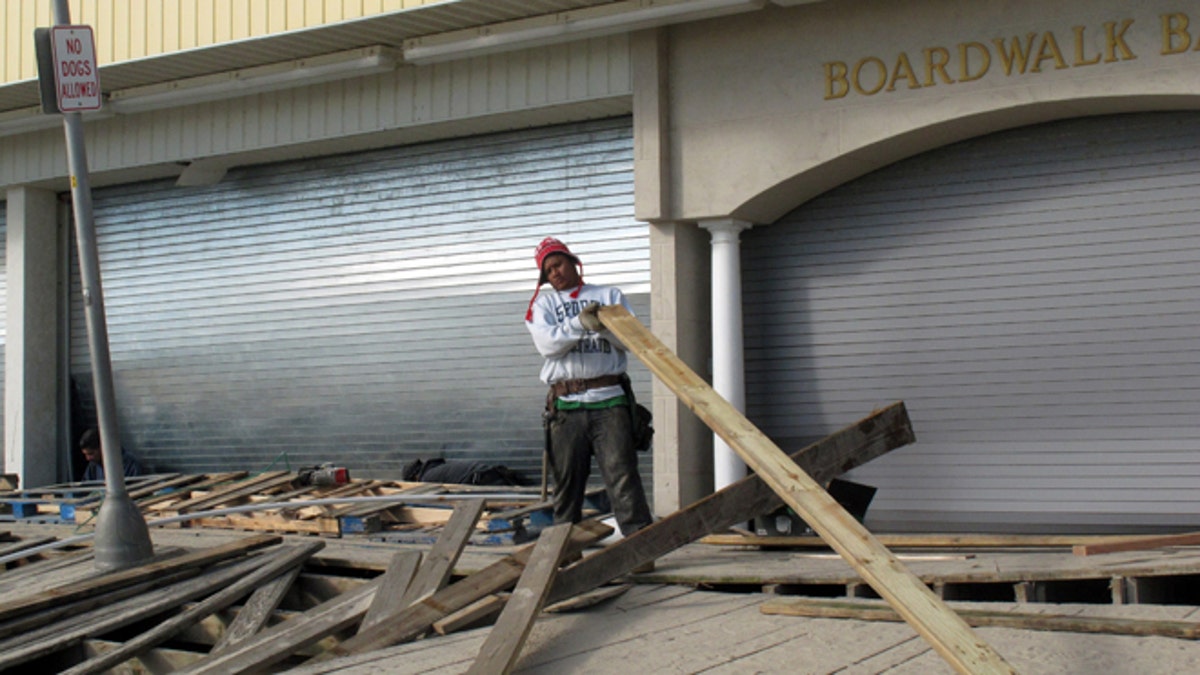
FILE: Nov. 1, 2012: A worker repairs the Point Pleasant Beach, N.J., boardwalk after Superstorm Sandy wrecked parts of it. (AP)
While almost all U.S. taxpayers will feel a financial pinch if Congress and President Obama fail to reach a compromise on the approaching fiscal crisis, families in New Jersey will be hit hardest, according to analysis by the Tax Foundation.
A four-person family in New Jersey with the median income of $101,682 would see its taxes go up 6.8 percent or about $6,933, said the Washington-based, non-partisan think tank. The tax increase would affect Garden State communities already crippled this year by Superstorm Sandy.
While the six states ranked hardest-hit by percentage increases all have median family incomes above the U.S. median of $74,563, the next 16 have below-average incomes -- from West Virginia at $65,403 to Nevada at $65,212.
“High-income states and low-income states will be the most affected,” foundation analyst Nick Kasprak told FoxNews.com on Wednesday. “People think the fiscal cuts are about the Bush tax cuts and that those are only for the rich but that’s not the case. It’s going to hit a lot of lower-income families.” Higher incomes also will get hit by changes to the Alternative Minimum Tax.
Maryland ranked second on the list. The median family of four making $107,000 a year would pay 6.7 percent more for an extra $7,194 in federal income taxes in 2013.
New Jersey families face a higher percentage compared to those in Maryland. But the average dollar increase would be lower because the state’s median income is below Maryland’s, Kasprak said.
President Obama and congressional Republicans are trying to reach a deal before Jan. 1, when a $500 billion mix of tax increases and fiscal spending cuts automatically begin, a prospect that economists fear could plunge the country into another recession. Should no deal be reached, the amount of across-the-board cuts to the federal budget could total more than $1 trillion over the next 10 years.
In August 2011, Congress agreed that deep spending cuts would kick in if they couldn’t reach a budget agreement.
But the fiscal threat is compounded by the looming end of the Bush-era tax rates.
Connecticut will be the third hardest hit. A typical family of four there would see taxes jump by 6.62 percent or $6,653. Massachusetts and New Hampshire rounded out the top five. All are “blue states” that Obama won in 2012.
States were ranked using information from the Census Bureau and the Internal Revenue Service. The complexity of the tax code will affect households in different ways, Kasprak said. How much people have to pay depends on such factors as marital status, income and the number of children.
Low-income households are likely to feel the impact almost immediately. The loss of provisions in the 2009 economic recovery act, which includes the expanded availability of the earned-income credit and tax breaks for college expenses, would dry up.
On Wednesday, House Speaker John Boehner said “serious differences” still remain between Republicans and the Obama administration over taxes and spending. Both sides have three weeks to agree on a plan or risk more damage to an already fragile U.S. economy.
Boehner said the president’s proposal for $1.4 trillion in new tax revenues falls short of his promise for a balanced approach to reigning in the federal deficit and could not pass Congress.




